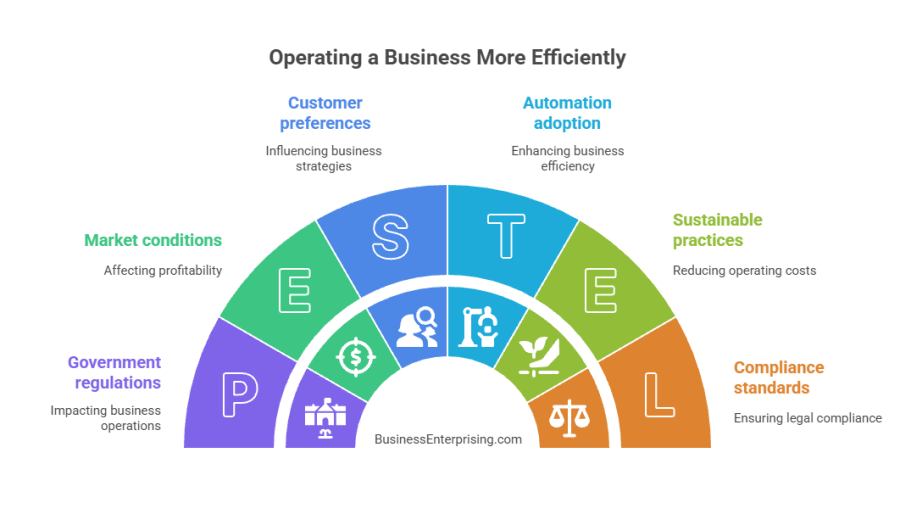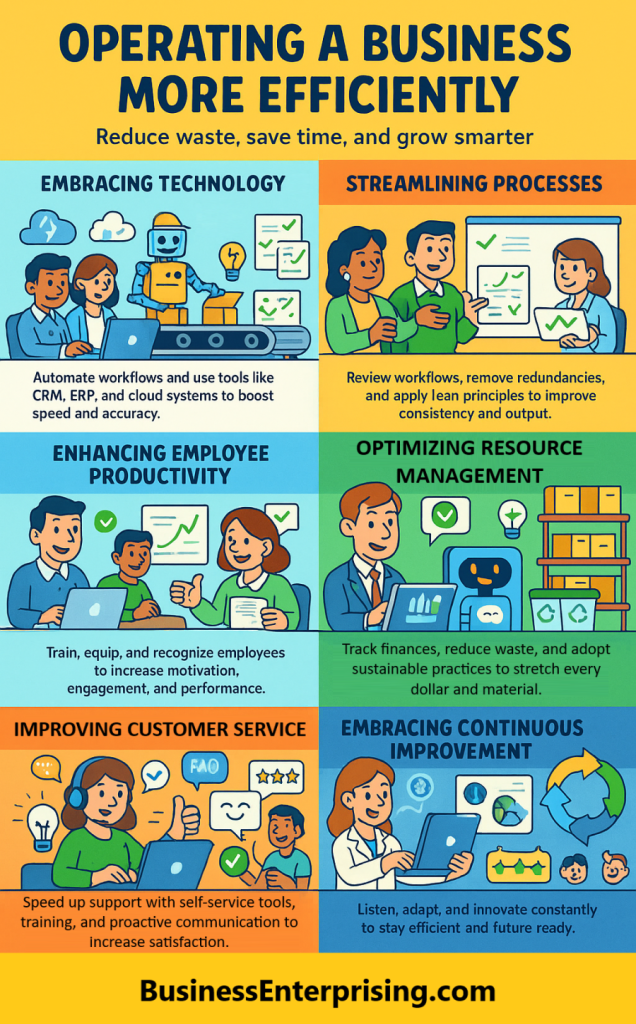 For business owners struggling with low profits and high expenses, strategies for operating a business more efficiently is critical. Efficiency translates to reduced costs, increased productivity, and enhanced customer satisfaction. Achieving operational efficiency requires a strategic approach that integrates technology, streamlines processes, and maximizes resources. This article explores comprehensive strategies that businesses can implement to operate more efficiently, ultimately driving growth and profitability.
For business owners struggling with low profits and high expenses, strategies for operating a business more efficiently is critical. Efficiency translates to reduced costs, increased productivity, and enhanced customer satisfaction. Achieving operational efficiency requires a strategic approach that integrates technology, streamlines processes, and maximizes resources. This article explores comprehensive strategies that businesses can implement to operate more efficiently, ultimately driving growth and profitability.
Embracing Technology
One of the most effective ways to enhance business efficiency is by leveraging technology. Modern technological advancements can automate routine tasks, reduce errors, and save time. Implementing enterprise resource planning (ERP) systems, for example, can integrate various business processes into a single streamlined system. This integration allows for real-time data sharing and improved decision-making.
Moreover, customer relationship management (CRM) software can optimize interactions with clients by providing valuable insights into customer preferences and behavior. By analyzing this data, companies can tailor their services to meet specific customer needs, improving satisfaction and loyalty. Additionally, automation tools can handle repetitive tasks such as invoicing, payroll, and inventory management, freeing up employees to focus on more strategic activities.
Adopting cloud-based solutions can also enhance efficiency by providing flexible access to data and applications from any location. Cloud computing reduces the need for on-premises hardware, lowers maintenance costs, and ensures that employees can collaborate effectively, regardless of their physical location. This flexibility is particularly beneficial in today’s remote and hybrid work environments.
Streamlining Processes
Streamlining business processes is another critical aspect of operating a business more efficiently. Companies should regularly review their workflows to identify and eliminate bottlenecks and redundancies. Mapping out processes in detail can highlight areas where time and resources are wasted. Once these inefficiencies are identified, businesses can implement changes to optimize workflow and improve productivity.
Standardizing processes across the organization can also lead to significant efficiency gains. Establishing clear protocols and guidelines ensures that tasks are performed consistently and accurately. Training employees on standardized procedures reduces variability and enhances overall performance. Additionally, implementing quality control measures can help maintain high standards and minimize errors.
Lean management principles, which focus on minimizing waste and maximizing value, can be particularly effective in streamlining operations. By applying lean techniques such as just-in-time inventory management and continuous improvement, companies can reduce excess inventory, improve production processes, and enhance overall efficiency.
Enhancing Employee Productivity
Employee productivity is a crucial factor in operating a business efficiently. Companies should invest in their workforce by providing ongoing training and development opportunities. Equipping employees with the necessary skills and knowledge not only enhances their performance but also boosts morale and engagement. Engaged employees are more likely to contribute to the company’s success and embrace efficiency initiatives.
Creating a positive work environment is essential for maintaining high levels of productivity. Encouraging open communication, recognizing employee achievements, and fostering a collaborative culture can motivate employees to perform at their best. Additionally, providing the right tools and resources is critical. Ensuring that employees have access to modern technology, ergonomic workspaces, and adequate support can significantly enhance their efficiency.
Setting clear goals and expectations is another effective strategy for improving productivity. Employees should understand their roles and responsibilities and how their work contributes to the company’s objectives. Regular performance reviews and feedback sessions can help align individual efforts with organizational goals and identify areas for improvement.
Optimizing Resource Management
Efficient resource management is vital for operating a business more efficiently. Companies should monitor their use of resources, including time, materials, and finances, to ensure they are utilized effectively. Implementing resource management software can provide real-time visibility into resource allocation, helping businesses optimize their usage and reduce waste.
Financial management plays a crucial role in operational efficiency. Businesses should maintain accurate financial records, conduct regular audits, and implement cost control measures. Budgeting and forecasting tools can help companies plan their expenditures and identify areas where costs can be reduced. Additionally, negotiating favorable terms with suppliers and seeking bulk purchase discounts can lead to significant savings.
Sustainable practices can also enhance resource efficiency. By adopting environmentally friendly initiatives such as reducing energy consumption, minimizing waste, and recycling materials, companies can lower their operating costs and contribute to environmental sustainability. Implementing sustainable practices not only improves efficiency but also enhances the company’s reputation and appeal to eco-conscious consumers.
Improving Customer Service
Efficient customer service is a key component of operational efficiency. Satisfied customers are more likely to remain loyal and refer others to the business. Companies should focus on delivering exceptional customer experiences by responding promptly to inquiries, resolving issues quickly, and exceeding customer expectations.
Implementing self-service options such as online FAQs, chatbots, and customer portals can reduce the workload on customer service representatives and provide customers with quick access to information. Additionally, investing in customer service training ensures that employees are equipped to handle inquiries effectively and professionally.
Collecting and analyzing customer feedback is crucial for identifying areas where service can be improved. By listening to customers and addressing their concerns, companies can enhance their service quality and build stronger relationships. Furthermore, proactive communication, such as providing regular updates and personalized offers, can increase customer satisfaction and loyalty.
Leveraging Data Analytics
Data analytics is a powerful tool for improving operational efficiency. By analyzing data from various sources, companies can gain valuable insights into their operations, identify trends, and make informed decisions. Implementing data analytics tools can help businesses track key performance indicators (KPIs), monitor progress, and optimize processes.
Predictive analytics can also play a significant role in enhancing efficiency. By analyzing historical data, companies can forecast future trends and make proactive adjustments to their strategies. For example, predictive analytics can help businesses anticipate demand fluctuations, optimize inventory levels, and improve supply chain management.
Additionally, data-driven decision-making can enhance marketing efforts. By analyzing customer data, companies can develop targeted marketing campaigns that resonate with their audience and drive better results. Personalizing marketing messages based on customer preferences and behavior can increase engagement and conversion rates.
Embracing Continuous Improvement
Continuous improvement is a mindset that drives ongoing efforts to enhance efficiency and performance. Companies should foster a culture of continuous improvement by encouraging employees to identify and implement process improvements. Regularly reviewing and refining business processes ensures that the organization remains agile and responsive to changes.
Implementing feedback loops can facilitate continuous improvement. By gathering feedback from employees, customers, and other stakeholders, companies can identify areas for enhancement and make data-driven decisions. Additionally, conducting regular performance evaluations and benchmarking against industry standards can help businesses measure their progress and set new goals.
Investing in innovation is another critical aspect of continuous improvement. Companies should allocate resources for research and development to explore new technologies, products, and services. Embracing innovation not only enhances efficiency but also positions the company for long-term success and competitiveness.
Conclusion
Operating a business more efficiently requires a strategic and holistic approach. By embracing technology, streamlining processes, enhancing employee productivity, optimizing resource management, improving customer service, leveraging data analytics, and fostering a culture of continuous improvement, companies can achieve significant efficiency gains and drive sustainable growth.
In conclusion, efficiency is a critical driver of business success. Companies that prioritize operational efficiency are better positioned to compete in today’s fast-paced market, deliver superior customer experiences, and achieve long-term profitability. As the business landscape continues to evolve, staying committed to efficiency and innovation will be key to maintaining a competitive edge and achieving enduring success.


